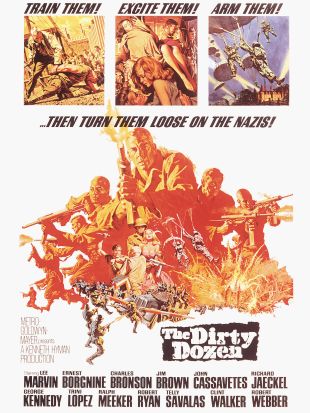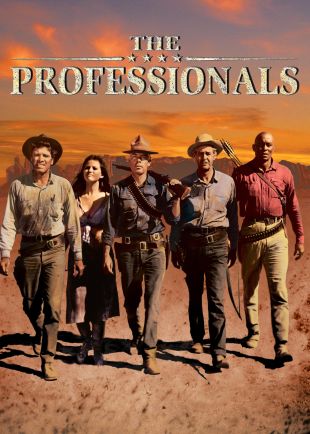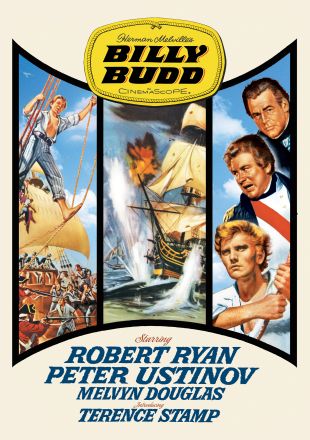It was his failure as a playwright that led Robert Ryan to a three-decade career as an actor. He was a unique presence on both the stage and screen, and in the Hollywood community, where he was that rarity: a two-fisted liberal. In many ways, at the end of the 1940s, Ryan was the liberals' answer to John Wayne, and he even managed to work alongside the right-wing icon in Flying Leathernecks (1951).
The son of a successful building contractor, Ryan was born in Chicago in 1909 and attended Dartmouth College, where one of his fraternity brothers was Nelson Rockefeller. He was a top athlete at the school and held its heavyweight boxing title for four straight years. Ryan graduated in 1932, during the depths of the Great Depression, and intended to write plays. Finding no opportunities available in this field, he became a day laborer; he stoked coal on a ship bound for Africa, worked as a sandhog, and herded horses in Montana, among other jobs. Ryan finally had his chance to write as a member of a theater company in Chicago, but proved unsuccessful and turned to acting. He arrived in Hollywood at the end of the '30s and studied at the Max Reinhardt Workshop, making his professional stage debut in 1940. He appeared in small roles for Paramount Pictures, but Ryan's real film career didn't begin until several years later. He returned east to appear in stock, and landed a part in Clifford Odets' Clash by Night, in which he worked opposite Tallulah Bankhead and got excellent reviews. Ryan came to regard that production and his work with Bankhead as the pivotal point in his career. The reviews of the play brought him to the attention of studio casting offices, and he was signed by RKO. The actor made his debut at the studio in the wartime action thriller Bombardier. It was a good beginning, although his early films were fairly lackluster and his career was interrupted by World War II -- he joined the Marines in 1944 and spent the next three years in uniform.
Ryan's screen career took off when he returned to civilian life in 1947. He starred in two of the studio's best releases that year: Jean Renoir's The Woman on the Beach and Edward Dmytryk's Crossfire, the latter an extraordinary film for its time dealing with troubled veterans and virulent anti-Semitism, with Ryan giving an Oscar-nominated performance as an unrepentant murderer of an innocent Jewish man. He continued to do good work in difficult movies, including the Joseph Losey symbolic drama The Boy With Green Hair (1948) and with Robert Wise's The Set-Up (1949). The latter film (which Ryan regarded as his favorite of all of his movies) was practically dumped onto the market by RKO, though the studio soon found itself with an unexpected success when the film received good reviews, it was entered in the Cannes Film Festival, and it won the Best Picture award in the British Academy Award competition. Ryan also distinguished himself that year in Dmytryk's Act of Violence and Max Ophüls' Caught, Nicholas Ray's On Dangerous Ground in 1951, and then repeated his stage success a decade out in Fritz Lang's Clash by Night (1952). Along with Robert Mitchum, Ryan practically kept the studio afloat during those years, providing solid leading performances in dozens of movies. In the late '50s, he moved into work at other studios and proved to be one of the most versatile leading actors in Hollywood, playing heroes and villains with equal conviction and success in such diverse productions as John Sturges' Bad Day at Black Rock (1955), Anthony Mann's God's Little Acre (1958), Wise's Odds Against Tomorrow (1959), and Peter Ustinov's Billy Budd (1962). Even in films that were less-than-good overall, he was often their saving grace, nowhere more so than in Ray's King of Kings (1961), in which he portrayed John the Baptist.
Even during the late '40s, Ryan was never bashful about his belief in liberal causes, and was a highly vocal supporter of the so-called "Hollywood Ten" at a time when most other movie professionals -- fearful for their livelihoods -- had abandoned them. He was also a founder of SANE, an anti-nuclear proliferation group, and served on the board of the American Civil Liberties Union. During the early '50s, he'd fully expected to be named in investigations and called by the House Select Committee on Un-American Activities or Senator Joseph R. McCarthy, but somehow Ryan was never cited, despite his public positions. In later years, he attributed it to his Irish last name, his Catholic faith, and the fact that he'd been a marine.
Considering his career's focus on movies from the outset, Ryan also fared amazingly well as a stage actor. In addition to Clash by Night, he distinguished himself in theatrical productions of Shakespeare's Coriolanus in 1954 at Broadway's Phoenix Theater and a 1960 production of Antony and Cleopatra opposite Katharine Hepburn at the American Shakespeare Festival. (Hepburn later proposed him for the lead in the Irving Berlin musical Mr. President in 1962.) Ryan's other theatrical credits included his portrayal of the title role in the Nottingham (England) Repertory Theater's production of Othello, Walter Burns in a 1969 revival of The Front Page, and James Tyrone in a 1971 revival of Long Day's Journey Into Night.
Not all of Ryan's later films were that good. His parts as the American field commander in Battle of the Bulge and Lee Marvin's army antagonist in The Dirty Dozen were written very unevenly, though he was good in them. He was also a strange choice (though very funny) for black comedy in William Castle's The Busy Body, and he wasn't onscreen long enough (though he was excellent in his scenes) in Robert Siodmak's Custer of the West. But for every poor fit like these, there were such movies as John Sturges' Hour of the Gun and Sam Peckinpah's The Wild Bunch, in which he excelled. His success in Long Day's Journey Into Night was as prelude to his last critical success, as Larry in John Frankenheimer's The Iceman Cometh (1973). Ironically, at the time he was playing a terminally ill character in front of the camera, Ryan knew that he was dying from lung cancer. During this time he also filmed a hard-hitting anti-smoking public service announcement that directly attributed his condition to his long-time heavy use of cigarettes.


